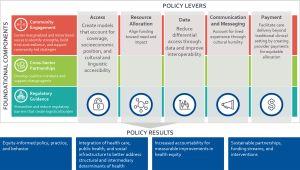
Journal Article
Redressing Systemic Inequities: Five Lessons For Community-Based COVID-19 Testing From The RADx-UP Initiative
Many historically marginalized populations have faced differential access to COVID-19 resources, such as testing, vaccinations, or therapeutics. To date, national efforts to increase access to COVID-19 testing have included support for rural health clinics and local pharmacies, extending insurance coverage for at-home tests, and distributing free at-home tests directly to households. Yet, making tests available through existing health networks or online platforms does not remove all systemic barriers including limited access to reliable broadband access, low insurance coverage rates, or limited trust and access to primary care physicians or pharmacy networks.
Furthermore, data show persistent gaps in access and uptake of at-home COVID-19 test kits, noting usage most common among non-Hispanic, White adults, individuals ages 30–39, and individuals with household incomes above $150,000. Recent widespread rollback of measures that protect communities systemically excluded from health systems—including masking mandates and reductions in funding for COVID-19 mitigation services for populations who are uninsured—illustrate the need for continued efforts to provide equitable, community-based COVID-19 testing solutions for historically marginalized populations.
Systemic barriers will continue to be foundational in inequalities that we can anticipate in care for communities experiencing the greatest impact by subsequent COVID-19 waves, limited access to test-to-treat models, and postacute COVID-19 syndromes.
In September 2020, the National Institutes of Health (NIH) launched the Rapid Acceleration of Diagnostics-Underserved Populations (RADx-UP) initiative with a $500 million investment in community-engaged research. Its aim is to increase access and uptake of SARS-CoV-2 tests in historically marginalized populations. RADx-UP represents the single largest health disparities research investment in the history of the NIH.
More than 120 RADx-UP projects are evaluating community-based research studies to serve communities experiencing the greatest impact of COVID-19, including Black, Hispanic, Latino or Latinx, American Indian, Alaska Native, Asian, Native Hawaiian and Pacific Islanders communities as well as people who live in rural areas or are incarcerated, low-income, unhoused, older adults, children, disabled, and pregnant. The RADx-UP projects are evaluating strategies to remove barriers that prevent people from accessing testing in a timely manner—a necessary step for ongoing access to COVID-19 treatment and broader health reform efforts to improve population health.
Community-based COVID-19 testing models offer a solution to redress historical and contemporary experiences of systemic exclusion and structural racism that contribute to adverse health outcomes.
In this article, we highlight lessons from the RADx-UP Initiative to illustrate how equity-focused strategies can expand testing uptake today and in the future. These lessons provide a framework and important policy directions for scaling up community-based approaches. We provide a more in-depth description of the framework, barriers and challenges to community-based COVID-19 testing, and case examples and real-world solutions in a white paper by the RADx-UP Community Engagement core.
